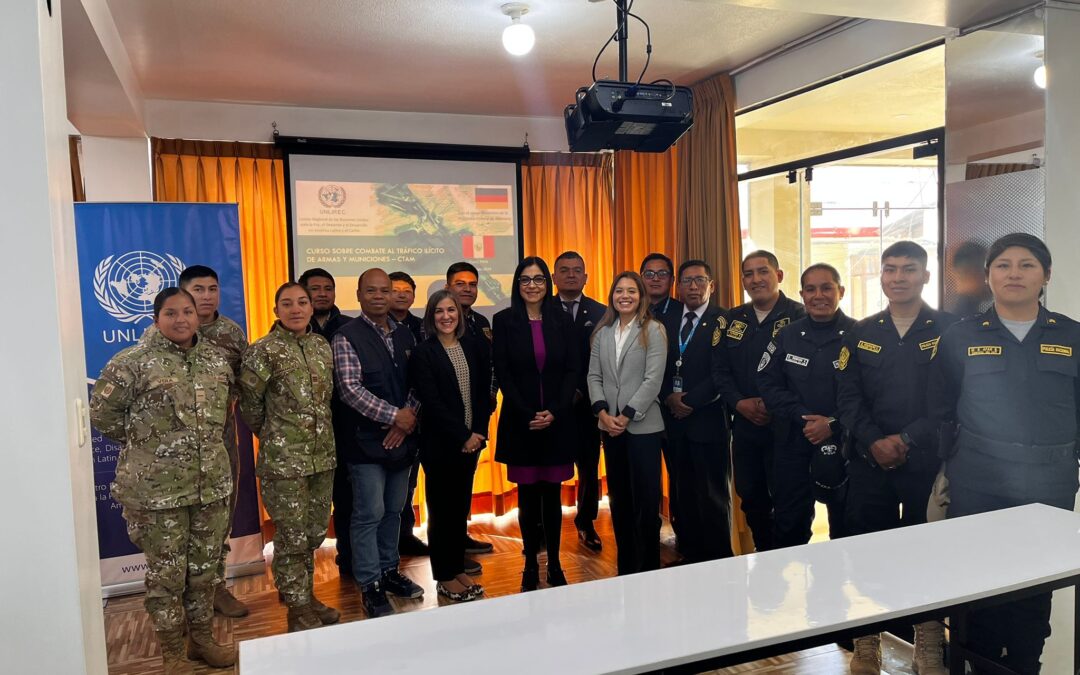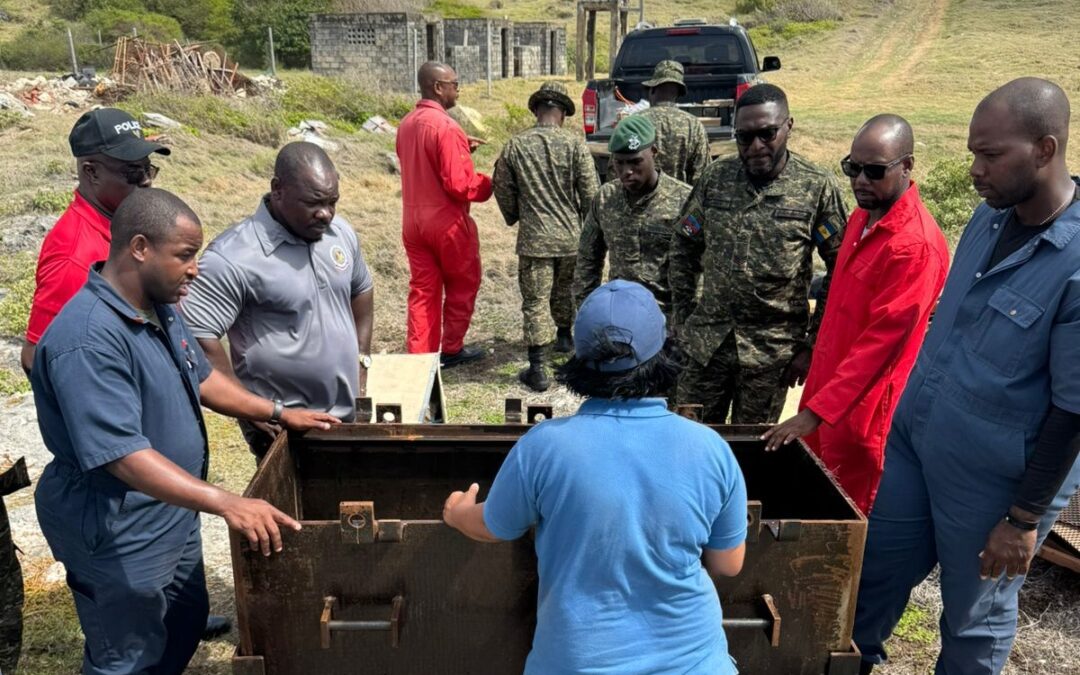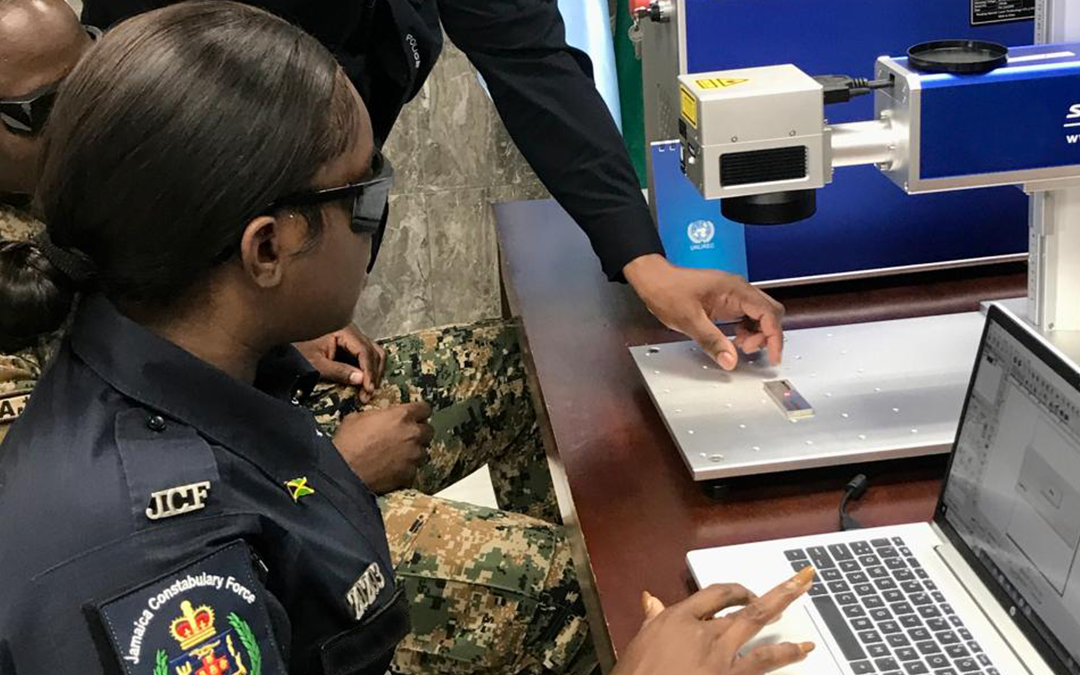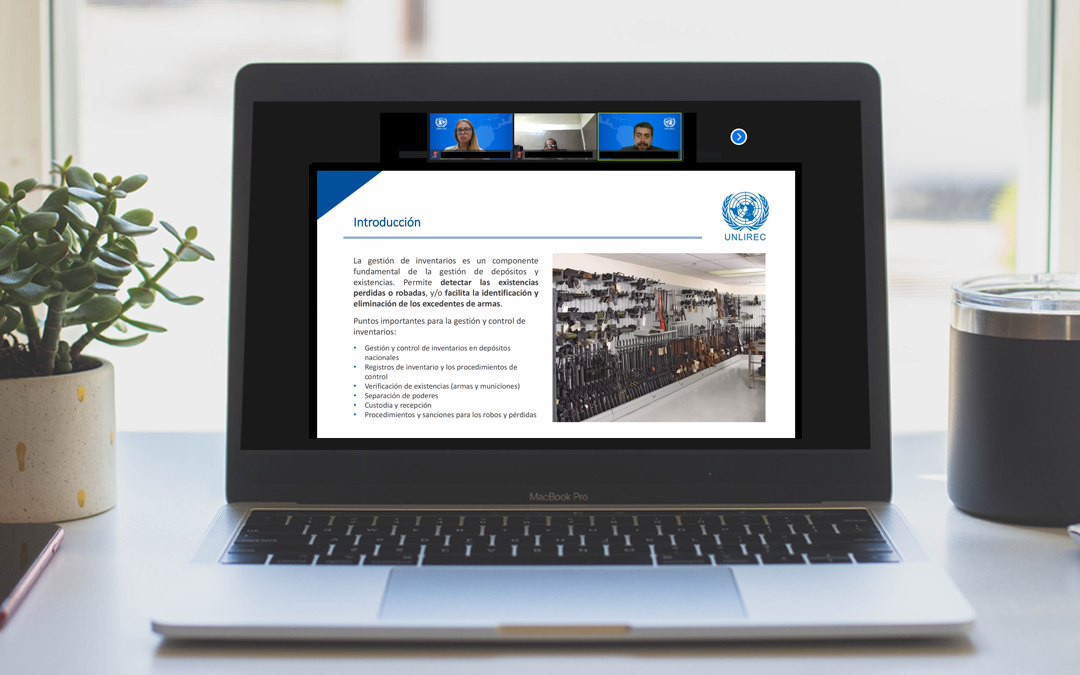
Jun 6, 2024 | Conventional Arms Programme
From June 3 to 6,2024, 22 officials participated in the Course on Combating Trafficking in Arms and Ammunition (CTAM), organized by the United Nations Regional Centre for Peace, Disarmament and Development in Latin America and the Caribbean (UNLIREC) in collaboration with the Ministry of Foreign Affairs of Peru.
Participants included personnel from the Puno region’s SUNAT-Customs, the Army, the Navy, the National Intelligence Directorate, the National Police of Peru, the National Superintendency for the Control of Security Services, Arms, Ammunition, and Explosives for Civilian Use (SUCAMEC), and local surveillance services (Serenazgo). They shared their experiences and challenges in addressing the issue of illicit arms trafficking.
During the opening of the event, the Coordinator of the Presidency of the National Commission against the Illicit Manufacturing and Trafficking of Firearms, Ammunition, Explosives and Other Related Materials (CONATIAF) expressed gratitude to UNLIREC and the Government of Germany for their support. She encouraged participants to share innovative initiatives that may arise from the course.
CTAM provided national authorities with valuable knowledge and tools, covering the global and regional landscape of arms trafficking, methods of illicit arms manufacturing, systems for controlling and documenting international transfers of firearms and ammunition, and tools and mechanisms for international cooperation against firearms trafficking.
This edition of CTAM featured presentations from the National Intelligence Directorate and the Directorate of Security and Defense of the Ministry of Foreign Affairs. They discussed the current trends and challenges related to illicit arms trafficking in Peru, along with measures and policies being implemented to combat this crime.
INTERPOL also contributed to the course bypresenting its Firearms Programme, which highlighted essential resources for the registration and tracing of weapons, as well as the outcomes of recent operations in Latin America. This collaborative environment fostered inter-institutional information exchange and promoted international cooperation.
This activity is part of the project “Support for the Implementation of Subregional, Regional, and Global Instruments and Frameworks Related to the Control and Management of Small Arms and Ammunition in in Latin America and the Caribbean”, funded by Germany.

May 27, 2024 | Conventional Arms Programme
On 27 May 2024, the United Nations Regional Centre for Peace, Disarmament and Development in Latin America and the Caribbean (UNLIREC), in collaboration with the Government of Barbados, began a Small Arms and Ammunition Destruction Exercise funded by the US Department of States Office for Weapons Removal and Abatement (WRA).
Improper and long-term storage of obsolete, seized and surplus firearms and ammunition can be a risk. Their destruction plays a crucial role in preventing diversion from the legal to the illicit sphere.
This UNLIREC-led project contributes to making the Caribbean region a safer one by supporting States in the effective implementation of the ‘Roadmap for Implementing the Caribbean Priority Actions on the Illicit Proliferation of Firearms and Ammunition across the Caribbean in a Sustainable Manner by 2030’ (Caribbean Firearms Roadmap).
During the 5-day exercise, the Barbados Police Service and the Barbados Defence Force destroyed a quantity of small arms and various calibers of ammunition. Additionally, during the period, four persons were trained in the destruction of weapons using hydraulic shears. Three independent government and civil society observers participated in the exercise. A Light Ammunition Burning Tank was also donated to the Government of Barbados by UNLIREC and will aid the future destruction of ammunition.
Since 2010, 23 Latin American and Caribbean States have destroyed more than 110,000 small arms and light weapons and more than 140 tonnes of ammunition with UNLIREC support.
UNLIREC, as the regional office of the UN Office for Disarmament, seeks to advance the cause of practical disarmament in Latin America and the Caribbean as part of its commitment to support Member States in their implementation of international disarmament and non-proliferation instruments, in particular, the 2001 UN Programme of Action on Small Arms.
May 2, 2024 | Conventional Arms Programme
From 2 to 27 May, the United Nations Regional Centre for Peace, Disarmament and Development in Latin America and the Caribbean (UNLIREC), in coordination with the Ministry of Foreign Affairs and Worship of Costa Rica and with the support of the Ministry of Public Security and the Costa Rican Post Office, is conducting the Course on Interception of Arms, Ammunition, Parts and Components (CIAMP), with the participation of 32 x-ray operators, 10 of them women.
This is the second edition of CIAMP in Costa Rica, this time in a hybrid format (with virtual and face-to-face sessions) bringing together officials from the Costa Rican Postal Service, the National Customs Service, the Penitentiary Police, the Airport Police, the Drug Control Police, the Border Police and the Air Surveillance Service.
In response to the challenges posed by trafficking of arms and ammunition in the region, a constantly evolving crime, UNLIREC seeks to contribute to the efforts of Costa Rica and all States in the region to combat and prevent the illicit trafficking of firearms, their parts, components, ammunition, and explosives that occurs through postal shipments, parcels, packages, and luggage. Notably, the CIAMP was developed as specialized training for X-ray operators responsible for control and inspection at strategic points.
During the training, participants are strengthening their skills identifying weapons, their parts, components, ammunition, and explosives, through a combination of theoretical and practical methodologies. The course includes practical training on a specialized virtual platform that allows participants to improve their ability to identify threats such as firearms, their parts and components, ammunition, and improvised explosive devices.
To enrich this training and promote knowledge exchange, participants from various national institutions will share their experiences in detecting firearms and ammunition using x-ray technology.
The Interdicting Small Arms, Ammunition, Parts and Components Course (CIAMP) is part of the technical assistance provided by UNLIREC under the project “Support to the Implementation of Subregional, Regional and Global Instruments and Frameworks related to Small Arms Control and Ammunition Management in Latin America and the Caribbean”, funded by the Federal Republic of Germany.

Apr 16, 2024 | Conventional Arms Programme
From 16 to 18 April 2024, the United Nations Regional Centre for Peace, Disarmament and Development in Latin America and the Caribbean (UNLIREC), in collaboration with the Government of Jamaica, carried out a firearms laser marking workshop in Kingston, Jamaica.
Twenty officials from key Jamaican agencies, including the Firearms Licensing Authority, Institute of Forensic Science and Legal Medicine, Jamaican Defense Force, Jamaica Constabulary Force, Jamaica Customs Agency, Ministry of National Security and Major Organized Crime and Anti-Corruption Agency, participated in the workshop. They built their knowledge about the international guidelines for marking firearms and practical skills to mark firearms using laser marking machines.
The three-day workshop featured a number of lectures on topics such as the international guidelines for marking firearms as a control measure, methods of marking firearms, technical recommendations for Latin American and Caribbean states to mark firearms, Jamaican Firearms law and policy on marking firearms, and the techniques to restore and trace serial numbers on firearms. Additionally, participants engaged in hands-on exercises focused on laser marking firearms.
Adequate marking of firearms is an essential step to ensure arms control and record-keeping, as well as to facilitate the tracing and investigation of illicit firearms. As such, it is crucial for an effective response to prevent diversion and counter illicit trafficking in firearms.
This initiative aligns with Goal 4 of the Caribbean Firearms Roadmap which seeks to reduce the risk of diversion of firearms and ammunition from government and non-government-owned arsenals.
The workshop was conducted within the framework of UNLIREC’s project “Preventing Diversion of Conventional Arms and Ammunition in the Caribbean”, funded by the U.S. Office of Weapons Removal and Abatement in the State Department’s Bureau of Political-Military Affairs.

Apr 16, 2024 | Conventional Arms Programme
On 16 April 2024, the United Nations Regional Centre for Peace, Disarmament and Development in Latin America and the Caribbean (UNLIREC), in collaboration with the Caribbean Community Implementation Agency for Crime and Security (CARICOM IMPACS), hosted the year’s first Partner Coordination meeting for the Caribbean Firearms Roadmap (CFRM).
This virtual meeting provided Implementing Partners with the opportunity to discuss progress made in the implementation of the Roadmap, and future support to be provided to States. This was done with the aim of furthering partner collaboration and coordination of activities.
During the session, topics discussed included: the status of National Action Plans and Monitoring and Evaluation processes; Outcomes of the 3rd Annual Meeting of States for the CFRM, held in Saint Lucia in November 2023; and the tools being used by partners to coordinate efforts. As part of the meeting, partners also discussed activities and support to be offered to States in 2024.
Sixteen persons participated in the event, including ten women. A wide range of partner organizations were present, including the International Criminal Police Organization (INTERPOL), Mines Advisory Group (MAG), Organization of American States (OAS), Small Arms Survey (SAS), United Nations Office on Drugs and Crime (UNODC), and World Customs Organization (WCO).
The Partner Coordination meeting was conducted in line with Goal 1 of the CFRM, to reinforce regulatory frameworks governing firearms and ammunition, particularly Target 1.3.3, as well as Sustainable Development Goal 16: Peace, justice and strong institutions, with particular relevance to Target 16.4. The meeting was made possible to generous funding from the government of Germany.
UNLIREC, as the regional centre for the UN Office for Disarmament Affairs, seeks to advance the cause of practical disarmament in Latin America and the Caribbean as part of its commitment to support Member States in their implementation of international disarmament and non-proliferation instruments, in particular, the 2001 UN Programme of Action on Small Arms (UN PoA).

Apr 8, 2024 | Conventional Arms Programme
8 APRIL 2024 – CONVENTIONAL ARMS PROGRAMME
From 8 to 11 April, twenty-five military and police officers reinforced their knowledge on physical security and stockpile management (PSSM) through a virtual training organized by the United Nations Regional Centre for Peace, Disarmament and Development in Latin America and the Caribbean (UNLIREC).
Effectively managing weapons and ammunition stockpiles not only mitigates the risk of loss and theft but also prevents accidents, helps to identify obsolete or surplus weapons, and, in turn, contributes to overall peace and security. As such, the main goal of the training was to enhance national capabilities in managing and securing stockpiles of weapons, ammunition, and explosives in accordance with international norms and standards, through theoretical lectures, practical exercises, and group discussions covering crucial aspects of PSSM.
Key topics included International Standards and Best Practices in Stockpile Management, including the Modular Small-Arms-Control Implementation Compendium (MOSAIC) and International Ammunition Technical Guidelines (IATGs). The sessions also delved into standard operating procedures and security plans, marking and recordkeeping, inventory management, and firearms and ammunition destruction procedures.
This workshop is linked to the Caribbean Firearm Roadmap, which foresees in its Goal 4 to systematically decrease the risk of diversion of firearms and ammunition from stockpiles. Moreover, adequate PSSM practices contribute to the implementation of international instruments, as well as the 2030 Agenda for Sustainable Development, which provide the umbrella framework for violence prevention, arms control and peace and security.
This activity is part of the technical assistance provided by UNLIREC in the framework of its project “Preventing Diversion of Conventional Arms and Ammunition in the Caribbean”, funded by the United States State Department, through its Weapons Removal and Abatement Bureau.





